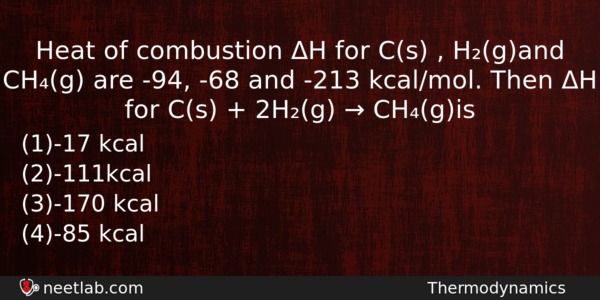| ⇦ | 
| ⇨ |
Heat of combustion ΔH for C(s) , H₂(g)and CH₄(g) are -94, -68 and -213 kcal/mol. Then ΔH for C(s) + 2H₂(g) → CH₄(g)is
Options
(a) -17 kcal
(b) -111kcal
(c) -170 kcal
(d) -85 kcal
Correct Answer:
-17 kcal
Explanation:
(i) C(s) + O₂ = CO₂ ; ΔH(i) = -94 kcal/mol,
(ii) 2H₂ + O₂ = 2H₂O ; ΔH(ii) = -68 x 2 kcal/mol,
(iii) CH₄ + 2O₂ = CO₂ + 2H₂O ; ΔH(iii) = -213 kcal/mol,
(iv) C(s) + 2H₂(g) = CH₄(g) ; ΔH(iv) = ?,
By applying Hess’s law we can compute ΔH(iv), (i) + (ii) – (iii), we have
C + O₂ + 2H₂ + O₂ – CH₄ – 2O₂ = CO₂ + 2H₂ O – CO₂ – 2H₂ O,
C+ 2H₂ = CH₄,
Therefore ΔH(iv) = ΔH(i) + ΔH(ii) – ΔH(iii) = (-94 – 68 x 2 + 213 ) kcal = -17 kcal.
Related Questions: - The electronic configuration of transition elements is exhibited by
- Which of the following is not correct for D₂O
- Mercurous chloride exists in the form of
- The functional isomer of ethanol is
- The van’t Hoff factor i for a compound which undergoes dissociation in one solvent
Topics: Thermodynamics
(179)
Subject: Chemistry
(2512)
Important MCQs Based on Medical Entrance Examinations To Improve Your NEET Score
- The electronic configuration of transition elements is exhibited by
- Which of the following is not correct for D₂O
- Mercurous chloride exists in the form of
- The functional isomer of ethanol is
- The van’t Hoff factor i for a compound which undergoes dissociation in one solvent
Topics: Thermodynamics (179)
Subject: Chemistry (2512)
Important MCQs Based on Medical Entrance Examinations To Improve Your NEET Score
18000+ students are using NEETLab to improve their score. What about you?
Solve Previous Year MCQs, Mock Tests, Topicwise Practice Tests, Identify Weak Topics, Formula Flash cards and much more is available in NEETLab Android App to improve your NEET score.
Share this page with your friends

Leave a Reply